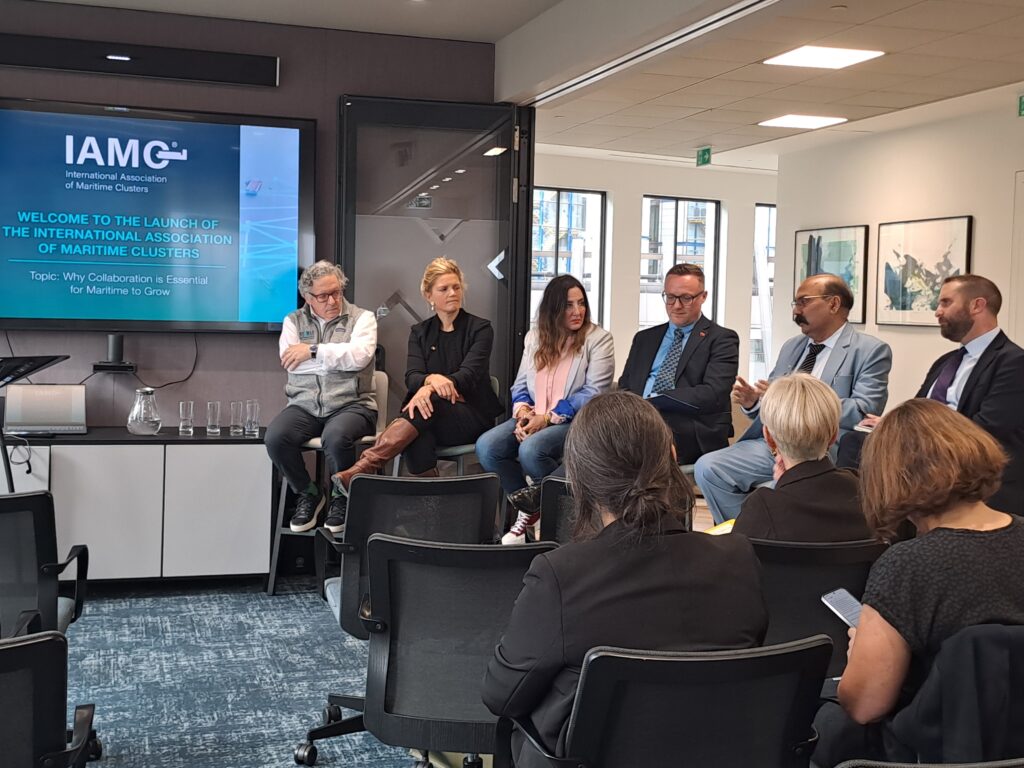NEWS
PSS team out and about during London International Shipping Week
News |Published: Oct 2, 2025
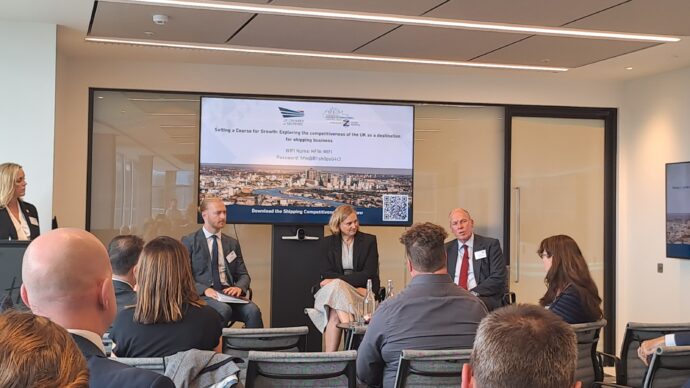
The team attended a number of events in September as part of London International Shipping Week (LISW), meeting members and contributing to the ongoing maritime conversation. Here’s what Debbie Cavaldoro, CEO; Angela Ward, skills, career and diversity lead; and Jen Maddison, health, safety and culture lead, got up to over the week.
Monday
From Ports to Pilots: Bringing aviation standards to marine operations
Debbie’s first event was at the HP Innovation centre to learn about what ports can learn from airports. The main focus was around the gathering and use of data to streamline port operations. The speakers made comparisons of turnaround time and downtime in airports compared to ports and how airlines work together to reduce airport calls and improve safety.
Setting a course for growth
The UK Chamber of Shipping hosted an event to launch their new report by the Centre for Economics and Business Research (Cebr), confirming the UK’s position as one of the world’s most competitive maritime nations.
The report ranked the UK fifth overall in the index and was particularly strong for regulatory environment and governance, and workforce.
The report included recommendations for the UK maritime industry and government:
- Consolidate UK leadership in regulation, legal services, and green shipping.
- Unlock infrastructure investment by streamlining planning and grid connections.
- Expand green finance through instruments like green loan guarantees.
- Modernise workforce policy with responsive immigration and enhanced training.
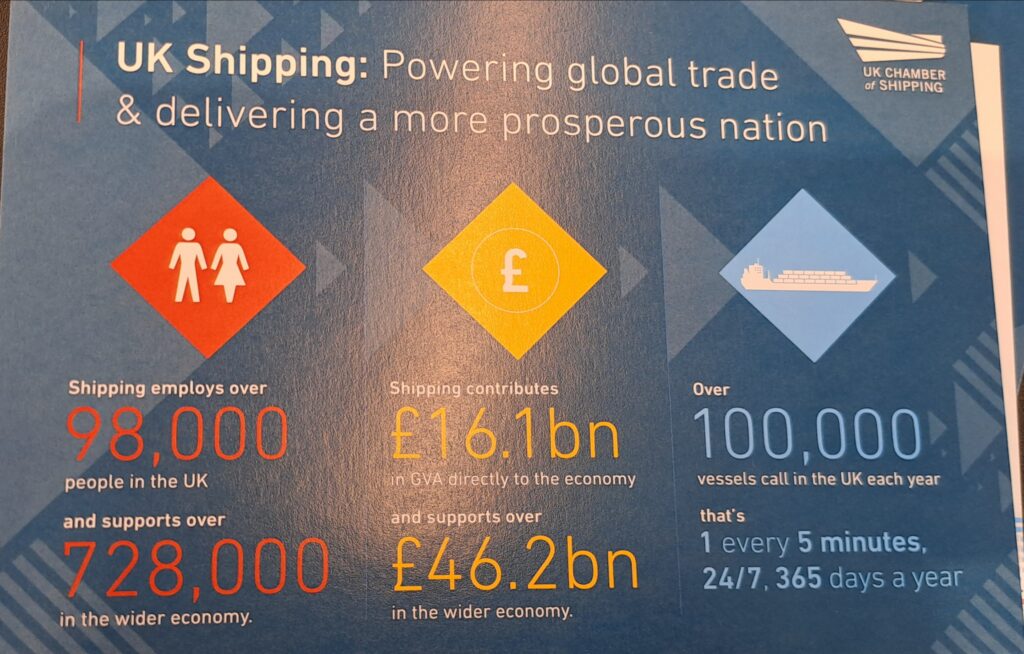
Fast Data, Smart Decisions: What Formula 1 can teach maritime
Jen took her place at the sell-out session with speaker Neil Martin, data scientist and former head of strategy at Ferrari. Formula 1’s relentless pursuit of excellence offers valuable lessons for the maritime and ports sectors, particularly in the areas of safety and organisational culture. The talk emphasised how F1 teams align every member—from the CEO to the cleaner—around clear objectives and lived values, ensuring everyone has a stake in success.
This culture of accountability and continuous improvement is underpinned by strict adherence to deadlines and a shared commitment to safety, as seen in the meticulous breakdown and optimisation of pit stop procedures. The sport’s history also provides cautionary tales, such as the consequences of compromising safety for competitive advantage, reinforcing the importance of robust safety protocols and ethical decision-making. Equally relevant to ports is Formula 1’s data-driven approach to learning and innovation.
Neil highlighted how F1 teams harness vast amounts of real-time data, advanced simulations, and AI to inform decisions, predict outcomes, and mitigate risks. By embracing digital tools and fostering a culture that values evidence-based learning, F1 has achieved significant gains in efficiency, sustainability, and performance. These practices; continuous analysis, rapid feedback loops, and creative problem-solving, should inspire ports to leverage their own data more effectively, driving safer operations and smarter, more agile decision-making in a rapidly evolving industry.
Scottish Maritime Cluster
Debbie was delighted to receive an invite to the Scottish Maritime Cluster meeting and met with many of PSS’s Scottish members. It was also a good opportunity to begin discussing a joint approach to the Scottish government around a joined-up approach to port apprenticeship standards across devolved governments.
Tuesday
Fuel for Thought: UK’s Leadership in Maritime Nuclear Innovation
Debbie joined representatives from maritime and the nuclear sectors to discuss the potential for UK to lead the industry in a move to nuclear energy in ports and for ships. The group agreed a set of actions including:
- The need for legislative modernisation.
- Requirement for a unified or agreed regulatory pathway: Debbie raised that problems had occurred in the past for port and shipping safety when it was unclear which regulatory body was responsible and arise in nuclear energy would mean there will also be a role for the Office for Nuclear Regulation.
- End-to-end value chain integrity.
- Strategic opportunity for UK leadership at the IMO.
This meeting took place the day after PSS member DP World announced it was investing in nuclear power and PSS will continue to engage in the discussions as the opportunities for ports emerge.
Global Leaders in Maritime Breakfast Conference
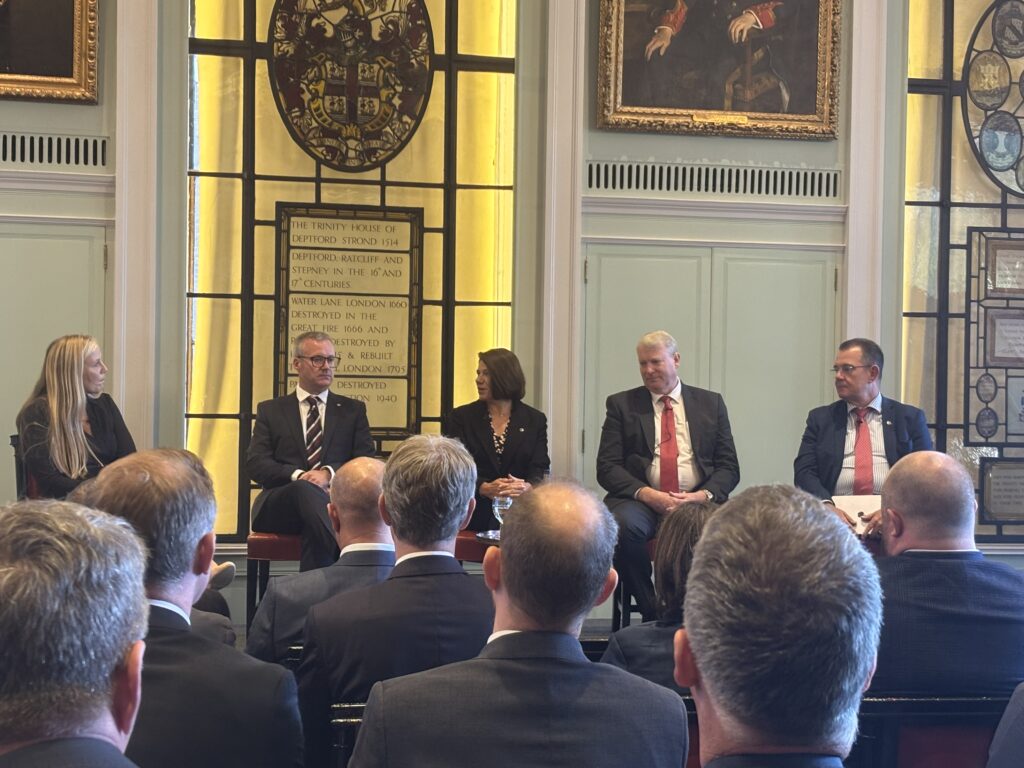
Angela started her week at Trinity House with an event that brought together senior leaders from across maritime to discuss pressing people-related challenges in the industry.
The session combined a presentation on Faststream’s latest research with a panel discussion featuring global HR, operations, and executive leaders and was particularly useful from a skills perspective.
Key points included:
- Talent attraction, retention, and leadership are critical to the sector’s success.
- The skills gap is widening as decarbonisation, and digitalisation demand new capabilities not yet common in the workplace.
- Leaders need to be resilient and adaptable to manage the uncertainty and change.
- There’s broad recognition of the need for more structured, sector-wide diversity and inclusion strategies.
- Maritime still struggles to attract new entrants, particularly younger generations.
The Future of UK Maritime: Skills, Technology and Sustainability
The House of Lords was the prestigious location for an update from the MCA on the future of the sector – with naturally more of a focus on shipping than the other parts of the industry.
MCA Chief Executive Virginia McVea, and policy leads also spoke about their wide-ranging work, including initiatives to support future seafarers, the pioneering of alternative fuel options, and an overview of smart shipping and autonomous operations.
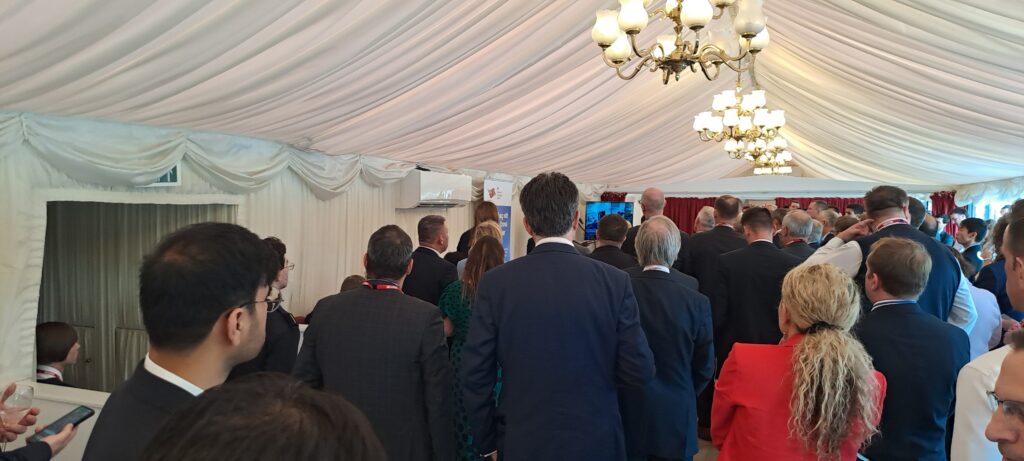
Breaking the Code of Silence: Maritime’s Data Dilemma
This Westminster style debate hosted by Inmarsat posed the question: does data transparency drive progress or can it destroy competitive edge?
The discussion centred on the maritime sector’s slow adoption of digital technologies, implementation remains limited — largely due to misaligned incentives and a lack of trust.
Key challenges include geopolitical sensitivities, commercial concerns, and a fear of litigation discourages open data sharing and prevents the reporting of near misses and safety incidents that could otherwise drive learning and improvement.
The debate highlighted the need to separate safety and compliance data from commercially sensitive information, and to reward individuals and organisations that contribute to the collective good. Trusted partnerships, clear frameworks, and a shift in mindset — from protectionism to collaboration — will be essential to unlocking the full potential of maritime data.
Competence of personnel management for safe operations of alternative fuelled ships
Jen attended the London Talks Live panel discussion, “Competence of personnel management for safe operations of alternative fuelled ships,” where industry experts highlighted a prevailing sentiment: widespread training for alternative fuel operations is not yet seen as a priority. The panel noted that, while the need for decarbonization is clear, the lack of operational alternative-fuelled ships and the minimal conversion of existing vessels have contributed to a wait-and-see approach. The lead time for the construction and launch of a alternatively fuelled vessel is so such that many ship owners believe that making immediate investment in specialized training is premature. As a result, the industry is holding off on large-scale training initiatives until the shift to alternative fuels becomes more imminent.
Navigating the Future – Maritime Autonomy, Innovation and Opportunity
This event at the QEII Centre featured industry leaders exploring how the UK can seize the opportunity to lead in this fast-developing field.
Captain Tom Shaves of the Royal Navy delivered the keynote speech positioning autonomy as central to naval modernisation and urging the UK to act decisively to remain competitive. The message included leveraging defence innovation, strong academia, and regulatory agility but also stressed the importance of the sector to focus on skills, partnerships, and commercial viability to turn innovation into sustainable opportunity.
Securing the Future of the Maritime Industry
The Royal Institute of Naval Architects provided critical insights into maritime compliance, risk management, and cybersecurity. Presentations addressed the sector’s evolving challenges and shared best practice.
The International Maritime Rescue Federation
The final event on Tuesday was an update from the International Maritime Rescue Federation (IMRF). CEO, Caroline Jupe, Chair of Trustees Jacob Tas, and Patron, Vice Admiral Sir Timothy Laurence, spoke about IMRF’s work with search and rescue organisations to help train responders and increase the number of women volunteering. The IMRF is also beginning to broaden its outreach by working with shipping companies who are often the rescue people at sea as part of the SOLAS convention.
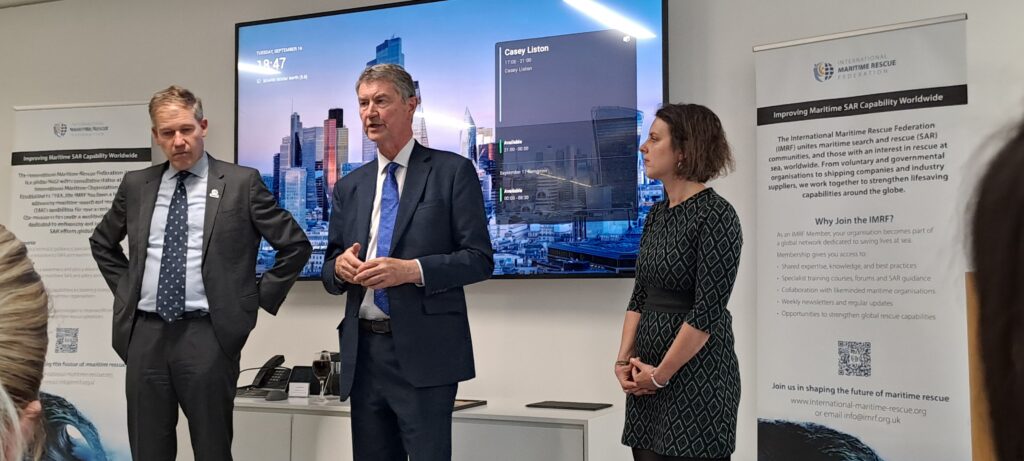
Wednesday
After a day filled with a PSS executive team meeting, Debbie, Angela and Jen all attended The Dare to be Different event at Sea Life London Aquarium. This was a wonderful venue for a networking event where the team also heard inspiring presentations highlighting the Isle of Man’s commitment to their unique island environment, fostering innovation and embracing change within the maritime sector.
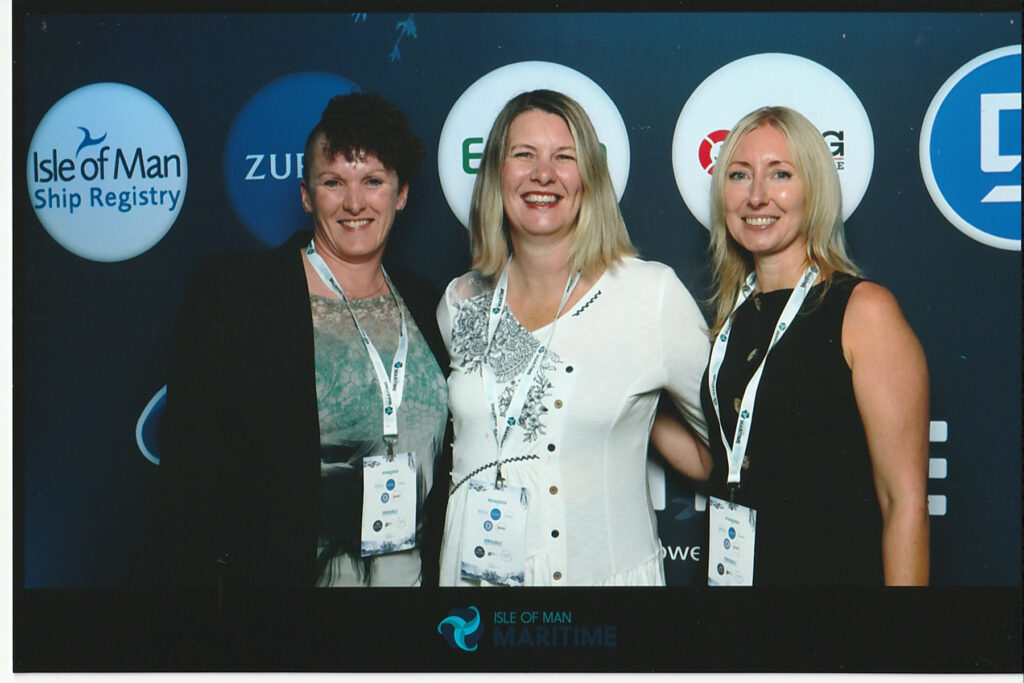
Thursday
Women in Ports networking event
The only event which PSS hosted was the Women in Ports event held on Thursday at Trinity House. A great event run jointly with the British Port Association, and UK Major Ports Group, sponsored by Associated British Ports.
PLA sustainability and innovation showcase
Jen and Umayya were delighted to represent Port Skills and Safety at the Port of London Authority’s Sustainability and Innovation Showcase, held aboard the Driftwood vessel. The event began with a short address from PLA representatives, followed by a scenic river trip that provided a unique setting for networking and collaboration. It was a fantastic opportunity to connect with fellow stakeholders from across the port and maritime sector, and to demonstrate the work PSS is doing to support safety and promote innovation.
PSS’s popular emergency flash cards sparked plenty of interest and conversation throughout the day. Jen and Umayya were kept busy with meaningful discussions with exhibitors, delegates and attendees — a clear sign of the sector’s appetite for innovation and shared learning.
Safety4Sea
This event focused on the challenges for shipping of digitalisation and the green transition, and their potential impacts on seafarer welfare. Upskilling and reskilling seafarers, including the need for leadership, soft skills, and cultural awareness were considered to be key issues.
International Maritime Clusters
The final event of LISW was a short panel discussion around the possibility of setting up an international association for maritime clusters.
Speakers came from some of the maritime various clusters, including New York, France, Isle of Man, the UK short straits and London. It is clearly early days for the establishment of any group of clusters but there was a general interest in clusters being able to learn from each other and share learning.
